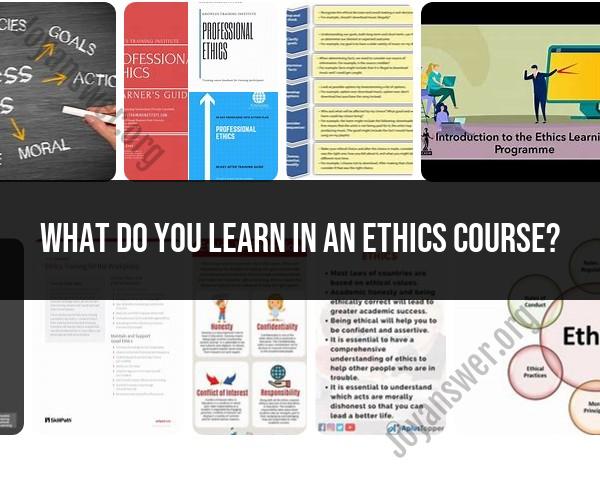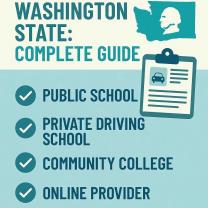What do you learn in an ethics course?
The curriculum of an ethics course typically covers a range of topics designed to help students understand and engage with ethical principles, theories, and real-world applications. The specific content can vary based on the level of the course (introductory, intermediate, or advanced), the academic institution, and the focus of the course (general ethics, applied ethics, business ethics, medical ethics, etc.). Below are key learning objectives that are often addressed in ethics courses:
Introduction to Ethical Theories:
- Explore major ethical theories, such as consequentialism, deontology, virtue ethics, and relativism.
- Understand the foundational concepts and principles that guide ethical reasoning.
Moral Reasoning:
- Develop skills in moral reasoning and critical thinking.
- Analyze and evaluate ethical arguments and dilemmas.
Applied Ethics:
- Examine ethical issues in various fields, such as business, medicine, technology, law, and the environment.
- Discuss real-world case studies to apply ethical theories to practical situations.
Social and Cultural Ethics:
- Explore ethical considerations related to cultural diversity, social justice, and human rights.
- Understand the impact of cultural context on ethical decision-making.
Personal Values and Ethical Decision-Making:
- Reflect on personal values and beliefs.
- Learn strategies for making ethical decisions in one's personal and professional life.
Professional Ethics:
- Explore ethical standards and responsibilities within specific professions (e.g., medicine, law, business).
- Understand the role of ethics in professional conduct.
Research Ethics:
- Learn about ethical considerations in research, including issues of informed consent, confidentiality, and data integrity.
- Understand the importance of ethical research practices.
Global Ethics:
- Discuss ethical challenges in a global context.
- Explore issues related to international relations, global justice, and cross-cultural ethics.
Technology and Ethics:
- Examine ethical implications of technology, including issues related to privacy, artificial intelligence, and digital ethics.
- Discuss responsible and ethical use of technology.
Environmental Ethics:
- Explore ethical considerations related to environmental sustainability, conservation, and climate change.
- Discuss the ethical responsibilities toward the natural world.
Ethics and Leadership:
- Understand the role of ethics in leadership.
- Explore principles of ethical leadership and decision-making.
Ethical Reasoning in Everyday Life:
- Apply ethical reasoning skills to everyday situations.
- Discuss the ethical dimensions of personal and social choices.
Values and Morality in Society:
- Examine the role of values and morality in shaping societal norms.
- Explore the relationship between ethics and social structures.
Philosophical Foundations:
- Gain an understanding of the historical and philosophical foundations of ethics.
- Study key ethical thinkers and their contributions.
The overall goal of an ethics course is to equip students with the knowledge and skills needed to navigate complex ethical issues, make informed and morally sound decisions, and contribute to ethical discourse in various spheres of life. The specific content and emphasis can vary, but these learning objectives are commonly addressed in ethics courses across different academic institutions.
What specific topics or modules are covered in an ethics course?
The specific topics and modules covered in an ethics course can vary significantly depending on several factors, including:
1. Institution and Discipline:
- Philosophy departments: Courses may focus on foundational ethical theories (utilitarianism, deontology, virtue ethics) and metaethics (nature of morality).
- Social science departments: Courses might emphasize applied ethics in specific fields like business, medicine, or environmental studies.
- Interdisciplinary courses: These may combine insights from various disciplines to explore ethical challenges within complex fields like technology or healthcare.
2. Course Level:
- Introductory courses: Introduce core concepts like moral reasoning, values, and common ethical theories.
- Upper-level courses: Deepen understanding of specific theories or apply them to specific scenarios (e.g., medical ethics case studies).
3. Course Focus:
- General ethics: Broad overview of various ethical theories and applications.
- Specific ethical theories: Focus on a particular theory like utilitarianism or care ethics.
- Applied ethics: Apply ethical principles to a specific field or issue (e.g., business ethics, environmental ethics).
Here are some common topics and modules you might encounter in an ethics course:
Foundational Concepts:
- Introduction to ethics and moral philosophy
- Key concepts like moral reasoning, values, virtues, and obligations
- Different branches of ethics: normative ethics, metaethics, applied ethics
Ethical Theories:
- Utilitarianism: maximizing overall happiness or good
- Deontology: duty-based ethics and respecting universal moral principles
- Virtue ethics: developing and practicing good character traits
- Care ethics: focusing on relationships, empathy, and connectedness
- Other theories like contractarianism, feminist ethics, and environmental ethics
Applied Ethics:
- Business ethics: corporate social responsibility, ethical decision-making in business, workplace conflicts
- Medical ethics: informed consent, end-of-life care, resource allocation in healthcare
- Environmental ethics: sustainability, ecological justice, animal rights
- Technology ethics: artificial intelligence, privacy, data security
- Political ethics: corruption, campaign finance, social justice issues
Case Studies and Scenarios:
- Analyzing real-world ethical dilemmas from various fields
- Applying ethical theories to practical situations
- Developing critical thinking and decision-making skills
Other Modules:
- Ethical reasoning frameworks and models
- Philosophical arguments and persuasion techniques
- Communication and dialogue skills for ethical discussions
- Contemporary ethical debates and controversies
Remember, this is just a sample, and the specific topics and modules covered will vary depending on the course you choose.
For a more accurate understanding, it's always best to consult the course syllabus or contact the instructor directly.
I hope this information helps! Let me know if you have any other questions or would like to explore specific ethics courses in more detail.













